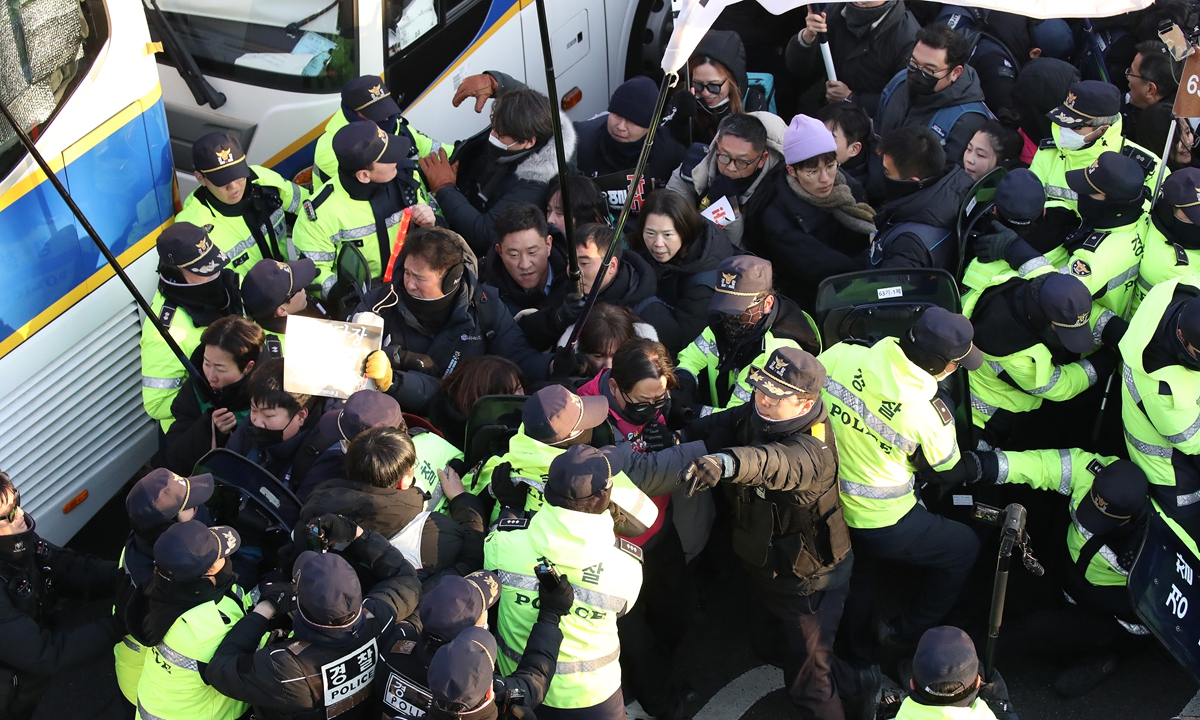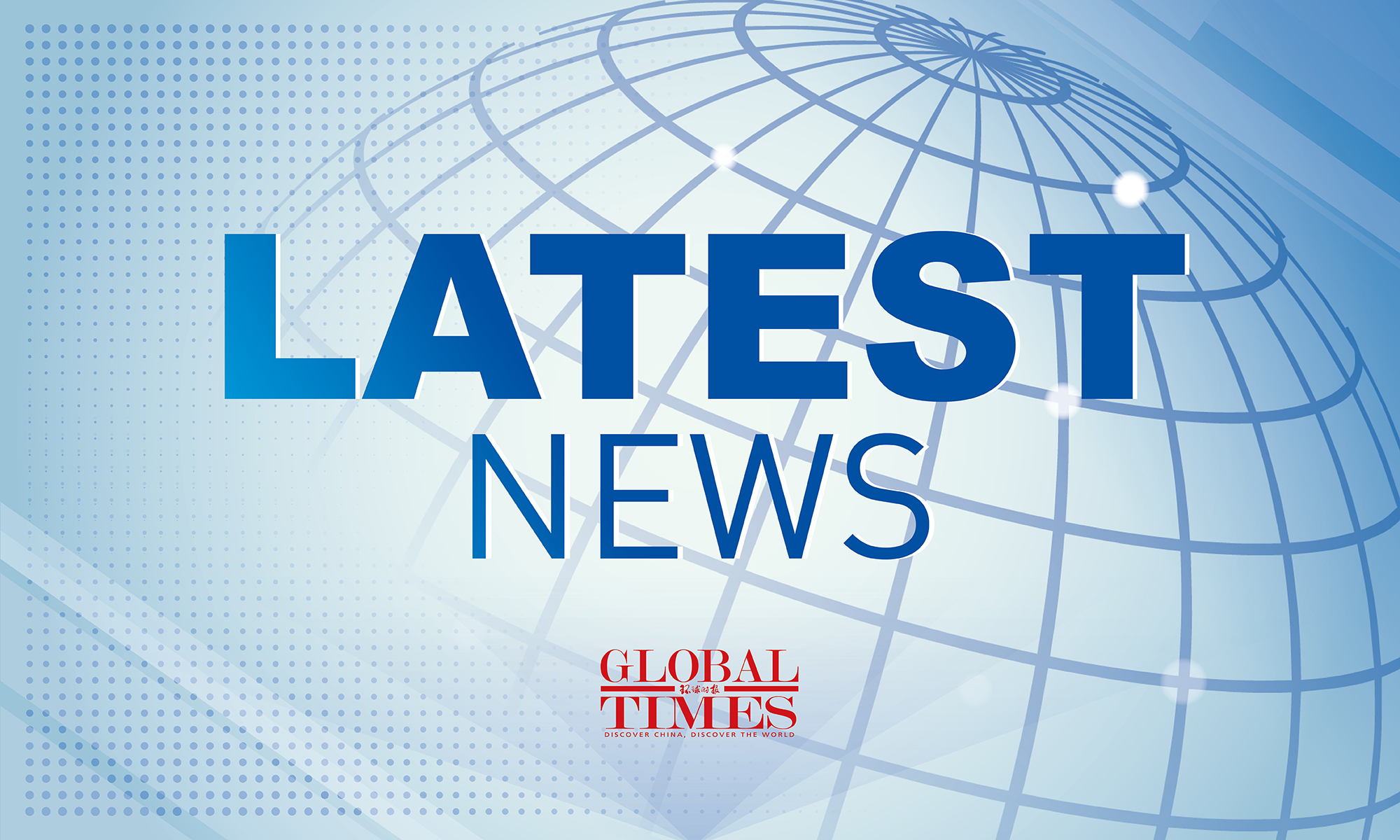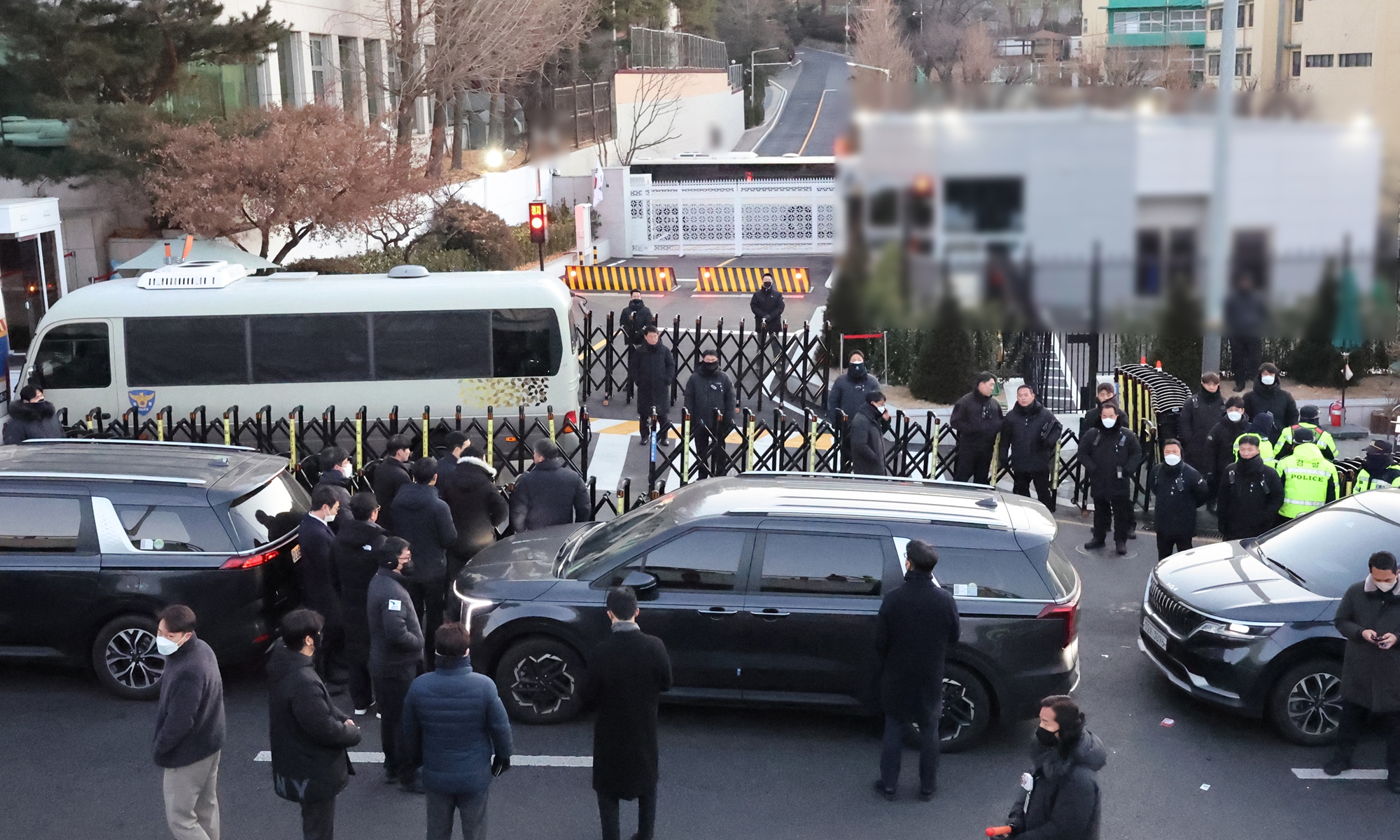S.Korean investigators' unprecedented arrest attempt on Yoon suspended after standoff
Political uncertainty remains amid escalating political, social split: expert

Members from the Korean Confederation of Trade Unions (KCTU) scuffle with police officers during a protest against impeached President Yoon Suk-yeol on January 3, 2025 in Seoul, South Korea. Photo: VCG
South Korea's anti-corruption agency attempted to detain impeached President Yoon Suk-yeol on Friday over his failed martial law bid - the first time in the country's modern history that an arrest warrant was issued against a sitting president, but the operation was thwarted following a standoff of more than five hours between investigators and presidential security staff, South Korean media reported.
With the arrest warrant set to expire on January 6, some analysts said that further efforts to execute the warrant could trigger additional confrontations amid escalating tensions between the ruling and opposition parties and prolong South Korea's ongoing political turmoil.
The Corruption Investigation Office for High-ranking Officials (CIO) said it halted execution of the warrant at 1:30 pm local time out of concerns for the safety of on-site personnel, Yonhap News Agency reported.
In a notice to the press, the CIO said, "We express serious regret over the behavior of the suspect who refused to comply with legally set procedures," adding that the agency plans to decide on the next step following a review.
The CIO has until January 6 to execute the detention warrant on charges of insurrection and abuse of power linked to Yoon's attempt to impose martial law on December 3. The CIO had been expected to try to detain Yoon on Friday, as executing the warrant on Saturday or Sunday could risk confronting even larger crowds, while executing it on January 6 would be too close to the deadline, according to Yonhap.
A total of 30 CIO investigators and 120 police personnel were deployed to execute the warrant. Around 8:02 am, 35 investigators arrived at the presidential residence and two minutes later, investigators began executing the arrest warrant - they walked through roadblocks set up in front of the presidential residence, then passed a bus barricade erected by the Presidential Security Service (PSS), where they faced off and clashed physically with the security staff. The investigators later broke through the first and second lines of the barricade within the residence and confronted the PSS again in front of the residence. The standoff continued until the CIO halted the execution of the warrant at 1:30 pm of local time, according to CCTV News.
The failure of the arrest operation was not surprising given the significant divisions among South Korea's ruling and opposition parties, various political factions, and the public over Yoon's arrest, Xiang Haoyu, a research fellow at the China Institute of International Studies, told the Global Times on Friday.
The possibility of investigators launching another attempt before January 6 remains, and if more forceful measures are taken, there is a risk of escalating confrontations and clashes, said Xiang.
More than 1,000 pro-Yoon protesters gathered near the residence on Friday morning. Surrounded by some 2,700 police officers deployed to maintain order, they chanted: "Illegal warrant. Completely invalid" and "Arrest the CIO." Anti-Yoon protesters led by the Korean Confederation of Trade Unions, meanwhile, vowed to stage an overnight rally near the residence to demand Yoon's arrest, according to Yonhap.
South Korea's constitutional court said Friday that it will hold hearings for Yoon's impeachment trial on January 14 and 16.
Uncertainty looms
Xiang said that Yoon's martial law attempt has triggered a profound political crisis with far-reaching consequences in South Korea. He is under criminal investigation for insurrection, and the CIO requested the detention warrant after Yoon ignored all three summonses to appear for questioning - the first time such action has been taken against a sitting president in the country, highlighting the gravity of the situation.
Whether in the impeachment proceedings or the ongoing judicial investigation, it appears unlikely that Yoon will avoid the charges. The focus in South Korea will soon shift to when and how Yoon will step down - a question that transcends party politics and has significant implications for the upcoming presidential election, said Xiang.
In a statement after the arrest effort was suspended, Yoon's legal team said the CIO had no authority to investigate insurrection and it was regrettable that it had tried to "forcibly execute an illegal and invalid arrest and search warrant" in a sensitive security area. The interim head of Yoon's People Power Party welcomed the suspension and said the investigation must be carried out without detaining Yoon, Reuters reported.
Meanwhile, the main opposition party on Friday released a statement urging the presidential security team to cooperate and "firmly refuse" any unlawful orders. The Democratic Party called on Yoon to "walk out of your residence, where you are cowardly hiding, and be obedient with the execution of your arrest warrant… All members of the Republic of Korea need to abide by law and order," the statement said, according to CNN.
Xiang said that political turmoil in South Korea is set to continue, with no easing in sight. Yoon's judicial investigation and impeachment proceedings may take months, while ongoing conflicts between political factions will last, keeping instability entrenched. The situation remains fluid, with significant uncertainty remaining over future developments.
For South Korea, this should be a time for celebrating the New Year; however, the country is facing multiple challenges, including internal political turmoil, economic downturns, and an aviation accident, Dong Xiangrong, senior research fellow at the National Institute of International Strategy at the Chinese Academy of Social Sciences, told the Global Times on Friday.
These issues have severely undermined public confidence and affected external confidence in South Korea. Overall, the country is going through a very difficult period, Dong noted.
South Korean Acting President Choi Sang-mok called for national harmony and unity and for trust in the government in a New Year's address on Tuesday, amid an unprecedented political crisis sparked by impeached President Yoon Suk-yeol's short-lived martial law declaration, according to Reuters.
"The Republic of Korea is in an unprecedentedly serious situation," Choi said in a written statement, citing changes around global trade, diplomacy and security, as well as domestic political uncertainty, according to the report.



